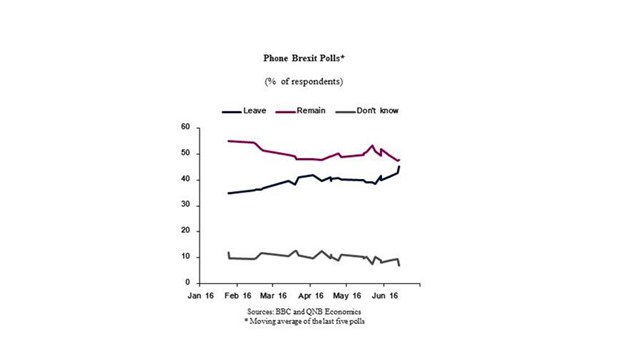Despite the “latest surge” in support for the ‘Leave’ campaign, the UK is likely to ‘Remain’ in the EU, QNB has said in an economic commentary.
Support for ‘Brexit’, the UK exit from the European Union (EU), has begun to surge almost two weeks ahead of the referendum, which will be held on June 23.
The Financial Times’ poll of polls has put the Leave campaign ahead for first time. Sterling is taking a pounding in financial markets, falling by 3.3% against the US dollar since the beginning of the month when the polls started to show a lead for Leave.
“Despite gathering momentum for the Leave campaign, we continue to believe that Brexit is less likely to occur than Remain. But if it did happen, it would have major implications for the UK, the EU and the world as a whole,” QNB said.
From the UK perspective, the economic case against Brexit is clear cut. Brexit would hurt exports since the UK would lose its free access to the EU, its largest export destination.
Brexit would undermine the UK’s financial services sector, which accounts for around 10% of total exports, because banks operating from the UK would lose their ability to do business in any EU state. Brexit is likely to result in a prolonged period of uncertainty about the UK’s relationship with the EU, about the political landscape in the UK (the prime minister will likely resign in the aftermath) and about potential Scottish independence.
This uncertainty would inhibit investment, hold back consumption and could result in recession.
“Brexit would also have major implications for the world economy and financial markets,” QNB said.
It may encourage other countries in the EU to follow the British example and exit, dismantling the European project. It could encourage isolationist policies beyond the EU, most notably in the US, where there is a presidential election later this year.
By slowing EU-UK trade, Brexit could hit global trade, which has already been struggling since the global financial crisis. Brexit could result in a rush to safe assets and cause capital flight from vulnerable emerging markets around the world.
“We are witnessing early signs of this,” QNB points out. The rush to safety has resulted in a decline of German 10-year bond yield to negative for the first time.
The VIX index, a measure of risk aversion shot up to 14 from 21 as polls showed increased support for Brexit.
Despite the Leave campaign picking up momentum in recent days, QNB continues to believe that ‘Remain’ is the most likely scenario for a number of reasons.
First, there is a tendency to vote for the status quo in referendums, both in the UK and around world. The UK has voted in favour of the status quo in nearly two thirds of its referendums, most notably in the EU referendum of 1975 and the more recent Scottish independence referendum of 2014.
This ratio seems to also hold globally with a vote for the status quo in 23 out of 34 referendums around the world studied by the political scientist Alan Renwick.
Second, while recent polls have shown a lead for the Leave campaign, this has been largely due to online polls, which tend to over-represent Brexit supporters. Online polls have been showing a close contest throughout, but the ‘Leave’ campaign has taken a lead in recent polls.
Meanwhile, phone polls, which tend to be more reliable, have shown consistent advantage for the ‘Remain’ campaign, although this advantage is narrowing.
Third, recent polls in favour of Brexit might increase participation of voters in the referendum, which would be a good thing for the ‘Remain’ camp. Remain voters, who are generally less active and vocal than their Leave counterparts, may be prompted to vote by the latest negative polls.
Finally, betting markets have continued to show a higher likelihood of ‘Remain’, with the implied probability of Leave around 40%. This likelihood has risen in recent days, but remains below 50%, consistent with the pattern seen in the phone polls.
QNB said it continues to hold the view that the UK will decide to remain in the EU as its baseline view, despite the latest surge in support for the Leave campaign.
That said, QNB does consider Brexit a “black swan” event—an improbable but high impact event. And its “impact would not stop at the UK borders, but would reverberate across different corners of the global economy and financial markets.”

